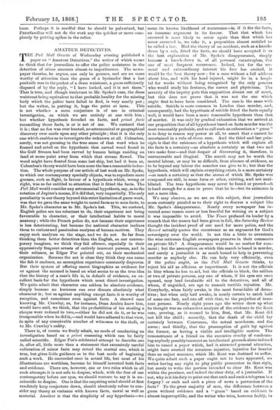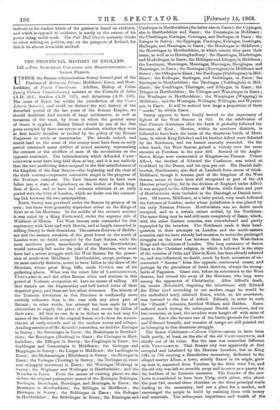AMATEUR DETECTIVES.
THE Pall Mall Gazette of Wednesday evening published a paper on "Amateur Detectives," the writer of which seems to think that for journalists to offer the police assistance in the detection of crime amounts almost to impertinence. The news- paper theories, he argues, can only be guesses, and are no more worthy of attention than the guess of a bystander that a lost penknife was in the pocket of a dress waistcoat, a guess sufficiently -disposed of by the reply, "I have looked, and it is not there." That is true, and tough irrelevant to Mr. Speke's case, the dress waistcoat being equivalent to that probable locality for the missing body which the police have failed to find, is very neatly put ; but the writer, in putting it, begs the point at issue. This is not whether a mere conjecture is of use in criminal investigation, on which we are entirely at one with him ; but whether hypothesis founded on facts, and prima facie reconciling those facts, is or is not of use. We contend that it is ; that no fox was ever hunted, no astronomical or geographical discovery ever made upon any other principle ; that it is the only -one which enables us to investigate the unknown at all. Columbus, surely, was not guessing in the true sense of that word when he framed and acted on the hypothesis that carved wood found in the Gulf Stream had been carved by human beings residing on land at some point away from which that stream flowed. The wood might have floated from some lost ship, but had it been so, Columbus's theory would have been none the less a reasonable induc- tion. The whole purpose of our article of last week on Mr. Speke, to which our contemporary specially objects, was to repudiate mere guesses, such as flight, in favour of a hypothesis which, wrong or right, was so far entitled to attention that it fitted the facts. The Pall Mall would consider any astronomical hypothesis, say, as to the rotation of Jupiter's moons, if it did that, very impartially. The only peculiarity in our theory beyond this strict limitation of guess-work, was that we gave the same weight to moral facts as to seen facts, to Mr. Speke's character as to Mr. Speke's hat. This, we contend, English police are too reluctant to do, their experience not being favourable to character, or their intellectual habits to moral -anatomy ; while the French police do, not because their experience is less deteriorating, but because the national character inclines them to curious and passionless analyses of human motives. They -enjoy such analyses on the stage, and we do not. So far from thinking them better detectives than the English, as our contem- porary imagines, we think they fail oftener, especially in their -oppressively frequent arrests of entirely innocent persons, and in their reliance, as Edgar Poe pointed out, on their mechanical -organization. Because the net is close they think they can name the fish it encloses, an assumption experience constantly disproves. But their system of offering secret biographies as evidence for -or against the accused is based on what seems to us the true idea that the history of a, man's life is, in default of evidence, an ex- cellent basis for the hypothesis which must direct investigation. We quite admit that character can seldom be absolute evidence, -simply because no keenness can ever discern absolutely what character is; but as against anything except facts it is worthy of reception, and sometimes even against facts. A shrewd man knowing Mr. Crawley, as, for instance, Dean Arabia knew him, would have said, we think, that the probabilities of his stealing a -cheque were reduced to two,—either he did not do it, or he was irresponsible when he did it,—and would have adhered to that view, in spite of any conceivable number of witnesses to the theft, or to Mr. Crawley's sanity.
There is, of course we freely admit, no mode of conducting an investigation based on a priori reasoning which can be fairly called scientific. Edgar Poe's celebrated attempt to describe one is, after all, little more than a statement that excessively careful -collocation of minor facts may reveal the central one, which is true, but gives little guidance as to the best mode of beginning such a work. He succeeded once in actual life, but most of his illustrations are worthless, because he himself invented both facts and evidence. There are, however, one or two rules which in all such attempts it is not safe to despise, which, with the fear of our contemporary before our eyes, we should venture to say it is un- scientific to despise. One is that the enquiring mind should at first resolutely keep conjecture down, should absolutely refuse to con- sider any theory at variance with known facts, moral as well as material. Another is that the simplicity of any hypothesis—we mean its known likelihood of recurrence—is, if it fits the facts, an immense argument in its favour. That that which has occurred is more likely to occur again than that which has never occurred is, we take it, a proposition almost entitled to be called a law. Had the theory of an accident, such as a knock- down by a cab, fitted the facts, we should have accepted it as the best explanation of Mr. Speke's disappearance, simply because a knock-down is, of all personal catastrophes, the one of most frequent recurrence. Indeed, but for the un- usual and extraordinary interest his fate has excited, it would be the best theory now ; for a man without a full address about him, and with his head injured, might lie in a hospi- tal for weeks without being recognized by the only persons who would study his features, the nurses and physicians. The severity of the inquiry puts this supposition almost out of court, but this does not prove that it was not the one which ought first to have been considered. The case is the same with suicide. Suicide is more common in London than murder, and, consequently, had the hypothesis of suicide fitted the facts equally well, it would have been a more reasonable hypothesis than that of murder. It was only by gradual exhaustion that we arrived at our proposition that of all hypotheses based on facts murder was the most reasonably probable, and to call such an exhaustion a" guess" is to deny to reason any power at all, to assert that x cannot be ascertained in a rule-of-three sum. And the third and last prin- ciple is that the existence of a hypothesis which will explain all the facts is a certainty—as absolute a certainty as that two and two make four—and that despair of discovering it, therefore, is unreasonable and illogical. The search may not be worth the mental labour, or may be so difficult, from absence of evidence, as to be beyond any labour the searcher can give to it ; but that the hypothesis, which will explain everything exists, is a mere certainty —as much a certainty as that the atoms of which Mr. Spoke was composed are still, in souse form or other, existing, and not anni- hilated. The true hypothesis may never be found or proved—it is hard enough for a man to prove that he is—but its existence is not a mere idea.
We may observe, as we are on this subject, that journalists seem curiously puzzled as to their right to discuss a subject like Mr. Speke's disappearance. Nearly every newspaper has in- vented some reason more or less fanciful for writing on a subject it was impossible to avoid. The Times prefaced its leader by a remark that the names had been given in full, the Saturday Review thought the incident proof of our need for more police, and the Record actually quotes the occurrence as an argument for God's sovereignty over the world. Is not this a little to overstrain the wise reticence English newspapers preserve in their comments on private life? A disappearance would be no matter for com- ment; but the assumption on which this search is based is murder, and surely a journalist is as much bound to help in preventing murder as anybody else. He can help very efficiently, even if the police ought, as the Pall Mall Gazette thinks, to reject his aid as officious or impertinent. It is not the officials in blue whom he has to aid, but the officials in black, the million or two of private persons, any one of whom, if his eyes are once opened, may lend invaluable aid to the detectives, and all of whom, if unguided, are apt to commit terrible injustice. Mr. Everybody, when fairly awake, is the most formidable of detec- tives; but when only half awake, is nearly certain to catch hold of some one fact, and run off with that, to the prejudice of inno- cent persons. Nearly eight years ago the writer drew up what he thought was an exhaustive analysis of the evidence in the Kent case, proving, as it seemed to him, first, that Mr. Kent did not kill the child ; secondly, that the death of the child lay certainly between Constance, the actual murderess, and the nurse ; and thirdly, that the presumption of guilt lay against the former, as having a visible and intelligible motive. The remonstrance of a friend on the excessive cruelty of condemn- ing anybody possiblyinnocent on intellectual grounds alone induced him to cancel a paper which, had it attracted general attention, might have averted the atrocious injustice, injustice far heavier than an unjust sentence, which Mr. Kent was destined to suffer. We quite admit such a paper ought not to have appeared, no writer having any right to play public prosecutor in that style, but surely to write the portion intended to clear Mr. Kent was within the province, and indeed the clear duty, of a journalist. If not, why is it his duty to point out that such and such a telegram is a forgery ? or such and such a piece of news a perversion of the facts? To the great majority of men, the difference between a guess without evidence and a " guess " based on evidence is almost imperceptible, and the writer who tries, however feebly, to indicate to his readers which of the guesses is based on evidence, and which is opposed to evidence, is surely to the extent of his power doing useful work. The Pall Mall Gazette certainly thinks so when writing on politics, say, on the prospects of Ireland, for this is its almost invariable method.































 Previous page
Previous page